by Frank Turk
Before we get to the festivities, some/many/most of you may have heard that Michael Spencer is not well. Whatever it is that is ailing him has him in the hospital, and is a very serious matter. They are hoping to get an actual diagnosis for him in the next week – after they nurse him back to healthy-enough to start tests.
That is a lousy way for anyone and his family to have to spend Christmas. Before I start the mayhem regarding Christmas, take a moment away from your KB and screen, kneel down, and pray for God’s mercy for Michael Spencer. Pray for God’s healing, and for good to come from this evil; and in lieu of a miracle, pray God gives the doctors and care-givers wisdom, insight, real skill, and a steady hand.

"Y’all?!" as we say here in the south.
That word (sic) is funny because you non-Southerners think it just means, "you-all", a sort of red-neck "you-plural". But it’s such a much more versatile word. As in this case, it doesn’t just mean, "all of you": it can mean "what exactly is wrong with all of you." It’s an interjection.
"Y’all?! Do I have to write
all the posts about Christmas around here?"
I recycled my series on
our joy because of God’s wrath over at
Evangel this year because obviously, those people needed to hear it. For those of you who missed it when I posted it originally, you can read through it without having to read the other stuff which may get you off your egg nog by chasing that link.
I will also have posted the traditional "
6-part harmony" at
Evangel this year (the link won’t work until 24 Dec 2009 around 0600 US-Eastern time), which you have also seen before.
"Yeah, cent: we’ve been meaning to talk to you about that," comes the very concerned and troubled brethren. "You seem to have sort of chummed up with those Colsonesque wobblies over there, and your total blogging in other venues has dropped off radically. Especially here. And what puzzles us most, dear brother, is that while you didn’t sign the MD, you are willing to co-bloggitate with all manner of theological canoodlers at
Evangel."
After a long and solemn pause, the question comes, "What gives?"
Sheesh.
Yeah, first of all, the canoodlers over there don’t like my brand of blogging any better than they ever did, as you can see by the strange alliance of people lining up behind Mark Olson to tell me my Gospel isn’t big enough.
Yeah, I know: don’t laugh at them. They’re serious.
But this is actually a post about Christmas, so I’m going to see your intervention and raise you the hot toddy of the season.
Now after Jesus was born in Bethlehem of Judea in the days of Herod the king, behold, wise men from the east came to Jerusalem, saying, "Where is he who has been born king of the Jews? For we saw his star when it rose and we have come to worship him." When Herod the king heard this, he was troubled, and all Jerusalem with him; and assembling all the chief priests and scribes of the people, he inquired of them where the Christ was to be born. They told him, "In Bethlehem of Judea, for so it is written by the prophet:
"'And you, O Bethlehem, in the land of Judah,
are by no means least among the rulers of Judah;
for from you shall come a ruler
who will shepherd my people Israel.'"
Then Herod summoned the wise men secretly and ascertained from them what time the star had appeared. And he sent them to Bethlehem, saying, "Go and search diligently for the child, and when you have found him, bring me word, that I too may come and worship him." After listening to the king, they went on their way. And behold, the star that they had seen when it rose went before them until it came to rest over the place where the child was. When they saw the star, they rejoiced exceedingly with great joy. And going into the house they saw the child with Mary his mother, and they fell down and worshiped him. Then, opening their treasures, they offered him gifts, gold and frankincense and myrrh. And being warned in a dream not to return to Herod, they departed to their own country by another way.
I know: this is post-Christmas scripture, if we ever cover it at all. It’s the part that leads to feast days and icons and other sorts of gift-giving and something which may or may not look like Santa but which avoids the jolly fat man.
But it is something we should consider seriously, and solemnly, and with a good bit of self-incrimination.
You see:
wise men from the east came to Jerusalem when Jesus was born.
Now, what is east of Jerusalem? That is: for Matthew, the Jew, who is writing to his fellow sons of Abraham, what is east of Jerusalem?
In one sense, there’s nothing: there’s not a blessed thing east of Jerusalem after the Sea of Galilee which any self-respecting Israelite would care to mention.
But on the other hand, there is a massive piece of Jewish history east of Jerusalem: Babylon, and the Medio-Persians. It’s the place they lived in exile for 70 years. It’s the place of the nation’s punishment for being completely non-plussed by YHVH and completely gaga over the other nations and their gods. It’s the place where Daniel was among the highest of the rulers of the kingdom, but where he didn’t let it go to his head (or his mouth).
And from there,
wise men came to Jerusalem. But not only that,
they came to worship the king of the Jews – "he who has been born king of the Jews". That little quotation there deserves its own post, but this is the day before the day before Christmas – we don’t have a lot of time for nuance. It looks like Matthew is saying, "it’s sorta obvious that Jesus was amazing because
even the Persians were sending guys in to see him."
And these guys came in
publicly. They were walking around Jerusalem asking people, "Have you seen the one who was born the king of the Jews? We’ve come to worship him." They thought that
everybody would know that this had happened.
But apparently, they were wrong.
Herod didn’t know it had happened, for example. And he had guys in his court who could cite the Jewish scripture.
So Herod, the acting King of the Jews, calls the wise men in
secretly to ask them what it is exactly they are talking about. What the Persians knew and would proclaim publicly, Herod and his court wanted to keep a private matter – for their own reasons, which of course turn out to be nefarious.
Now, what of it? How does this relate to Christmas, and
Evangel, and your complaint about the drunken master?
I think there are 3 basic take-aways here which you can take away at your own leisure:

[1] Coming to worship the one who was born King of the Jews is a public matter. This matter of a king in Israel (who is Jesus) deserves its own place in the world, which we cannot ever be ashamed of. If the Persians (and it could have been any stripe of Persians; it could have actually been Chinese as far as I’m concerned) could come to Jerusalem,
where the people ought to have been looking for this baby, and want to worship so much that it was common knowledge regarding what they were looking for, we who say we know Him, and say are His people, ought to be unashamed to tell others we’re here to worship. Have you seen this Jesus? I’m here to worship Him.
[2] I’d be wary of anyone who wants to only talk in private about the one who was born King of the Jews. Not just because of Herod’s lousy example, but because any private Jesus is a phony Jesus. If your Jesus is just a Jesus inside you, or inside your church, or inside your blog, and that Jesus has to live in a bunker to be safe (or worse: so that you can be safe), that’s not the Jesus who calls men from pagan Persia to worship him. The Jesus who makes us unsafe, and who causes unrest in this world, and causes kings to have private meetings to decide what to do about him, is the Jesus we need to be following.
[3] This relates to my co-bloggitating in this way: I think people need to see more Jesus. I’m not at liberty to list all the names which were on Joe Carter’s original invite to come and make merry with the Ecumeniacal, but I didn’t see a lot of people from our neck of the woods on the list. I did see plenty of the priests in the temple, and the scribes, and the rulers of the people, and the Hewittites, and the Colsonites, and maybe one or two who were eating locusts and wild honey. In that mix, given that I would have the free reign to blog what was necessary and what I was willing to say, this was like going to Jerusalem to ask around, "excuse me – someone was just born King of the Jews. Do you know about that?"
This has plainly caused unrest in the Ecumenicamp. In fact, it seems to me that some of them have never actually encountered the idea of a Jesus
greater than denominations and
greater than our systematics before because their apologetics against such a thing are so, well, unimpressive. If signing the Manhattan Declaration could have caused this much unrest among those who were inclined to sign it, I would have used
a big, fat magnum Sharpie to sign it and covered a whole page with my name.
So while I have blogged about generosity at Christmas before, and about the joy we have because of receiving Christ instead of wrath, this year I’m blogging (briefly) about the public offense of the child born in a manger, and the problems that he rightfully causes to our safe and secure ways of seeing him. You should be taking Him, and the news about Him, to the people who ought to know better so that they will worship Him. And only Him.
Good tidings of great joy to you, dear readers: let a real Jesus bring you repentance, a clean conscience, a sincere faith, and a true love of others as we consider this baby born King of the Jews.

 The stroke of midnight, as 12/31 turns to 1/1, is an artificial divider, but it is as good as any. Our birthdays cast the eye backwards, in retrospection. The grim realities of math and statistics may tap some of us on the shoulder with the reminder that the number of such dates before us is likely greater than that of those remaining.
The stroke of midnight, as 12/31 turns to 1/1, is an artificial divider, but it is as good as any. Our birthdays cast the eye backwards, in retrospection. The grim realities of math and statistics may tap some of us on the shoulder with the reminder that the number of such dates before us is likely greater than that of those remaining. But it is God's to determine both the course and the outcome — and He discharges His responsibility quite adequately (Proverbs 16:33; 20:24; Romans 11:36; Ephesians 1:11). None need concern himself that a man doing what a man should do will prevent God from what God infallibly does. In fact, it is quite literally impossible for a man to frustrate God's eternal purpose (Proverbs 19:21; 21:30; Daniel 4:35).
But it is God's to determine both the course and the outcome — and He discharges His responsibility quite adequately (Proverbs 16:33; 20:24; Romans 11:36; Ephesians 1:11). None need concern himself that a man doing what a man should do will prevent God from what God infallibly does. In fact, it is quite literally impossible for a man to frustrate God's eternal purpose (Proverbs 19:21; 21:30; Daniel 4:35). While it is true that our plans cannot frustrate God's counsel, it is equally true that His counsel can frustrate our plans. It is lazy, insolent unbelief to refuse to plan; but it is just as foolish to plan and assume, to plan without allowing for the ever-imperative "D.V." — Deo volente, "God willing" (cf. James 3:13-17).
While it is true that our plans cannot frustrate God's counsel, it is equally true that His counsel can frustrate our plans. It is lazy, insolent unbelief to refuse to plan; but it is just as foolish to plan and assume, to plan without allowing for the ever-imperative "D.V." — Deo volente, "God willing" (cf. James 3:13-17).

 I'm not a big fan of New Years resolutions, but many people get unusually-introspective at this time of year -- who knows why. Maybe they feel guilty for all the money the spent on stuff that they will garage sale in May.
I'm not a big fan of New Years resolutions, but many people get unusually-introspective at this time of year -- who knows why. Maybe they feel guilty for all the money the spent on stuff that they will garage sale in May.







 y desks (both at home and at the office) are piled high with books and other items I hoped to blog about this year and never got to. Not that I lacked opportunity; but I lacked motivation. After 5 years of blogging, I'm tired of writing on demand and (in case you haven't noticed) my posts for the past year or so have tended to reflect only whatever I'm most keenly interested in at the moment. I've been trying to stay away from themes and series that obligate me to write the next post on a specific topic in order to meet the daily deadlines.
y desks (both at home and at the office) are piled high with books and other items I hoped to blog about this year and never got to. Not that I lacked opportunity; but I lacked motivation. After 5 years of blogging, I'm tired of writing on demand and (in case you haven't noticed) my posts for the past year or so have tended to reflect only whatever I'm most keenly interested in at the moment. I've been trying to stay away from themes and series that obligate me to write the next post on a specific topic in order to meet the daily deadlines. Heaven Without Her, by Kitty Foth-Regner. This is the very touching personal testimony of a secular feminist whose only interest in spiritual things tended toward New-Age mysticism—until the impending death of her mother brought her face to face with some difficult questions that have no satisfying answers outside biblical Christianity. I was greatly moved by this book, perhaps because I read it in the wake of my own mother's death in January. The book is a graphic illustration of how God providentially draws and redeems people—often people who (from a human perspective) might seem the most unlikely candidates for conversion. Kitty Foth-Regner's worldview at the start of her journey could hardly have been more radically at odds with the faith that finally brought her settled peace. But the sovereign hand of divine Providence (evident throughout her testimony) wisely and lovingly led her through some of life's bitterest trials and sorrows into the unimaginable riches of grace. It's a tender story, well told.
Heaven Without Her, by Kitty Foth-Regner. This is the very touching personal testimony of a secular feminist whose only interest in spiritual things tended toward New-Age mysticism—until the impending death of her mother brought her face to face with some difficult questions that have no satisfying answers outside biblical Christianity. I was greatly moved by this book, perhaps because I read it in the wake of my own mother's death in January. The book is a graphic illustration of how God providentially draws and redeems people—often people who (from a human perspective) might seem the most unlikely candidates for conversion. Kitty Foth-Regner's worldview at the start of her journey could hardly have been more radically at odds with the faith that finally brought her settled peace. But the sovereign hand of divine Providence (evident throughout her testimony) wisely and lovingly led her through some of life's bitterest trials and sorrows into the unimaginable riches of grace. It's a tender story, well told.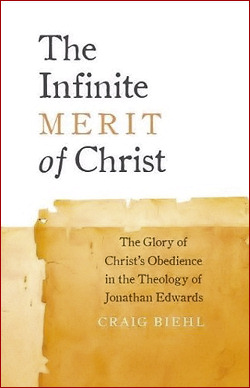 The Infinite Merit of Christ, Craig Biehl. I absolutely love this book. I like everything about it from the page design (with ample margins, a feature that has fallen out of fashion nowadays); to the flow of Biehl's (and Jonathan Edwards's) logic; to the conclusions Craig Biehl draws from his careful analysis of Jonathan Edwards's writings. The book is a study of the doctrine of justification (my favorite theological topic) from the writings of Jonathan Edwards (my favorite post-Puritan New England theologian) with specific emphasis on the significance of Christ's obedience (my favorite aspect of justification). Biehl provides a helpful rebuttal to several currently-popular points of view that have (for various reasons) downplayed the importance of imputed righteousness and rejected the significance of Christ's human obedience to Moses' law. This is a book to be reckoned with in all those debates. I got two copies, one for my shelf of Edwards studies and the other for the "justification" section of my "doctrine" stacks.
The Infinite Merit of Christ, Craig Biehl. I absolutely love this book. I like everything about it from the page design (with ample margins, a feature that has fallen out of fashion nowadays); to the flow of Biehl's (and Jonathan Edwards's) logic; to the conclusions Craig Biehl draws from his careful analysis of Jonathan Edwards's writings. The book is a study of the doctrine of justification (my favorite theological topic) from the writings of Jonathan Edwards (my favorite post-Puritan New England theologian) with specific emphasis on the significance of Christ's obedience (my favorite aspect of justification). Biehl provides a helpful rebuttal to several currently-popular points of view that have (for various reasons) downplayed the importance of imputed righteousness and rejected the significance of Christ's human obedience to Moses' law. This is a book to be reckoned with in all those debates. I got two copies, one for my shelf of Edwards studies and the other for the "justification" section of my "doctrine" stacks.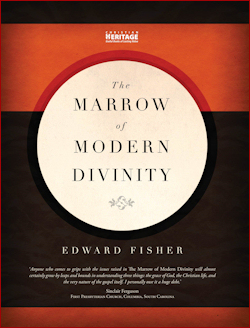 The Marrow of Modern Divinity, by Edward Fisher. This is the book that sparked the Marrow Controversy in eighteenth-century Scotland. That's one of my favorite episodes of theological controversy ever, and it continues to be one of the most important intramural debates among Calvinists. Thomas Boston and the Erskine brothers were on the angels' side in that debate, in my assessment. They and their allies are sometimes known as "The Marrow Men." Their opponents were high Calvinists of a severe and and anti-evangelistic sort. The high-Calvinist group held to a cluster of ideas that to this day surface and resurface in Internet forums and tend to breed hyper-Calvinism. I wish more of today's Calvinists had studied the Marrow controversy. I think a lot more gracious, tenderhearted, and evangelistic brand of Calvinism would be the result. (
The Marrow of Modern Divinity, by Edward Fisher. This is the book that sparked the Marrow Controversy in eighteenth-century Scotland. That's one of my favorite episodes of theological controversy ever, and it continues to be one of the most important intramural debates among Calvinists. Thomas Boston and the Erskine brothers were on the angels' side in that debate, in my assessment. They and their allies are sometimes known as "The Marrow Men." Their opponents were high Calvinists of a severe and and anti-evangelistic sort. The high-Calvinist group held to a cluster of ideas that to this day surface and resurface in Internet forums and tend to breed hyper-Calvinism. I wish more of today's Calvinists had studied the Marrow controversy. I think a lot more gracious, tenderhearted, and evangelistic brand of Calvinism would be the result. (
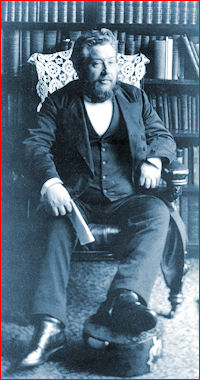
 h, how many there are that are never settled! The tree which should be transplanted every week would soon die. Nay, if it were moved, no matter how skilfully, once every year, no gardener would expect fruit from it. How many Christians there be that are transplanting themselves constantly, even as to their doctrinal sentiments?
h, how many there are that are never settled! The tree which should be transplanted every week would soon die. Nay, if it were moved, no matter how skilfully, once every year, no gardener would expect fruit from it. How many Christians there be that are transplanting themselves constantly, even as to their doctrinal sentiments?



 "Y’all?!" as we say here in the south.
"Y’all?!" as we say here in the south.




 know what you're thinking: we've already beaten the Manhattan Declaration to death, and we don't need another TeamPyro post on the issue.
know what you're thinking: we've already beaten the Manhattan Declaration to death, and we don't need another TeamPyro post on the issue. In fact, George implies that the main reason the ecumenical movement exists and is growing today is because the old doctrinal issues that divided Orthodox, Catholics, and Protestants simply aren't relevant in the culture war. Allowing doctrinal differences to keep us from putting up a completely united front in the culture war is "misguided," George says. How could our benighted spiritual ancestors have been so foolish as to disfellowship one another over differences about the gospel? Take, for example, "the differences between Catholics and Lutherans regarding justification." Were those really fundamental differences in the first place, or were the Reformers and the Council of Trent mostly just talking past one another? George offhandedly asserts that those things were mostly "misunderstandings" that have now been "clear[ed] away."
In fact, George implies that the main reason the ecumenical movement exists and is growing today is because the old doctrinal issues that divided Orthodox, Catholics, and Protestants simply aren't relevant in the culture war. Allowing doctrinal differences to keep us from putting up a completely united front in the culture war is "misguided," George says. How could our benighted spiritual ancestors have been so foolish as to disfellowship one another over differences about the gospel? Take, for example, "the differences between Catholics and Lutherans regarding justification." Were those really fundamental differences in the first place, or were the Reformers and the Council of Trent mostly just talking past one another? George offhandedly asserts that those things were mostly "misunderstandings" that have now been "clear[ed] away." Even the New York Times writer (David D. Kirkpatrick) seemed to sense that the biblical truths of original sin and human depravity posed a fairly fundamental challenge to Robert George's notion that society can be won to righteousness through human reason alone. He writes,
Even the New York Times writer (David D. Kirkpatrick) seemed to sense that the biblical truths of original sin and human depravity posed a fairly fundamental challenge to Robert George's notion that society can be won to righteousness through human reason alone. He writes,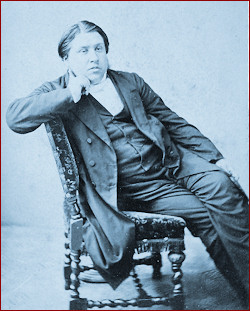 The
The  new god has been lately set up among men, the god of modern Christianity, the god of modern thought, a god made of honey or sugar or lead. He is all leniency, gentleness, mildness, and indifference in the matter of sin. Justice is not in him, and as for the punishment of sin, he knows it not.
new god has been lately set up among men, the god of modern Christianity, the god of modern thought, a god made of honey or sugar or lead. He is all leniency, gentleness, mildness, and indifference in the matter of sin. Justice is not in him, and as for the punishment of sin, he knows it not. Leftover comments about this week's discussion
Leftover comments about this week's discussion
 've had a couple of private conversations and received a few off-line e-mails this week [September 5-9, 1995] regarding the Millet-MacArthur meetings. Also, one or two issues came up in the comments that I wanted to respond to but didn't have time.
've had a couple of private conversations and received a few off-line e-mails this week [September 5-9, 1995] regarding the Millet-MacArthur meetings. Also, one or two issues came up in the comments that I wanted to respond to but didn't have time.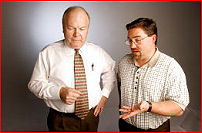


 n 1997 Carl Mosser and Paul Owen were graduate students at Talbot School of Theology. In April of that year, they jointly presented a paper at the Far West regional meeting of the Evangelical Theological Society. The paper, titled
n 1997 Carl Mosser and Paul Owen were graduate students at Talbot School of Theology. In April of that year, they jointly presented a paper at the Far West regional meeting of the Evangelical Theological Society. The paper, titled  Anyway, about a year after Mosser and Owen presented their ETS paper, they participated in an e-mail forum on apologetics where I occasionally posted. When the subject of Mormon soteriology came up, sure enough, the Millet-MacArthur meeting (see
Anyway, about a year after Mosser and Owen presented their ETS paper, they participated in an e-mail forum on apologetics where I occasionally posted. When the subject of Mormon soteriology came up, sure enough, the Millet-MacArthur meeting (see 








